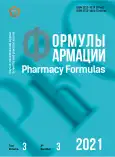Investigation of the properties and activity of DfCas9 and DsCas9 nucleases in eucaryotic cells
- Authors: Vlasova Y.V.1, Madera D.A.1, Gershovich P.M.1
-
Affiliations:
- BIOCAD JSC
- Issue: Vol 3, No 3 (2021)
- Pages: 10-23
- Section: Pharmaceutical Sciences
- URL: https://journal-vniispk.ru/PharmForm/article/view/80850
- DOI: https://doi.org/10.17816/phf80850
- ID: 80850
Cite item
Full Text
Abstract
This study is focused on the two novel nucleases of the CRISPR/Cas9 family, which were found in bacterial genomes of DfCas9 (Defluviimonas sp) и DsCas9 (Demequina sediminicola). Discovery of these nucleases was part of the results of a joint study conducted by BIOCAD together with Skoltech Institute of Science and Technology and Saint-Petersburg Polytechnical University (SPPU) under a grant agreement with the Department of Science and Education of Russian Federation (Agreement number 14.606.21.0006 from September, 26th 2017). Under the agreement the nucleases DfCas9 and DsCas9 were characterized in vitro by Skoltech and SPPU.
Based on the aforementioned results, in this study we characterized the genome-modifying nuclease activity of these enzymes in a mammalian cell line HEK293. Specifically, we created genetic constructs designed to express the nucleases DsCas9 and DfCas9 together with the necessary guide RNA molecules (sequences of the guide RNAs were described previously) [1]. We demonstrated expression of the nucleases on a protein level, as well as activity of DfCas9 at the VEGF2 locus in HEK293 cells. The theoretical study was conducted by analyzing international and national literature. The experimental part was performed with a restriction-ligation cloning method, transient transfections, Western blot protein detection method, and a T7 nuclease-based method of detection of heteroduplex double-stranded DNA.
Full Text
##article.viewOnOriginalSite##About the authors
Yelizaveta V. Vlasova
BIOCAD JSC
Email: vlasovaev@biocad.ru
Junior Researcher, Molecular Genetic Engineering Group
Russian Federation, 34 Svyazi st, St Petersburg, 198515Dmitry A. Madera
BIOCAD JSC
Email: biocad@biocad.ru
Senior Lecturer, REC TRB, Product Owner of the Department for the Development of Gene Therapy Products
Russian Federation, 34 Svyazi st, St Petersburg, 198515Pavel M. Gershovich
BIOCAD JSC
Author for correspondence.
Email: biocad@biocad.ru
acting director director of REC TRB, director of the department for the development of drugs for gene therapy
Russian Federation, 34 Svyazi st, St Petersburg, 198515References
- Fedorova I., Vasileva A., Selkova P., et al. PpCas9 from Pasteurella pneumotropica - a compact Type II-C Cas9 ortholog active in human cells // Nucleic Acids Res. 2020. Vol. 48, no. 21. P. 12297–12309. https://doi.org/10.1093/nar/gkaa998.
- Fujii W., Ito H., Kanke T., et al. Generation of genetically modified mice using SpCas9-NG engineered nuclease // Sci Rep. 2019. Vol. 9. P. 12878. https://doi.org/10.1038/s41598-019-49394-5.
- Ran F., Cong L., Yan W., et al. In vivo genome editing using Staphylococcus aureus Cas9 // Nature. 2015. Vol. 520. P. 186–191. https://doi.org/10.1038/nature14299.
- Endo M., et al. Genome editing in plants by engineered CRISPR-Cas9 recognizing NG PAM // Nat Plants. 2015. Vol. 5. P. 14–17. https://doi.org/10.1038/s41477-018-0321-8.
- Liu Z., Chen O., Wall J. B. J., et al. Systematic comparison of 2A peptides for cloning multi-genes in a polycistronic vector // Sci Rep. 2017. Vol. 7, no. 1. P. 2193. https://doi.org/10.1038/s41598-017-02460-2.
- Genbank. The Nucleotide database. 2021. URL: https://www.ncbi.nlm.nih.gov/nucleotide.
Supplementary files











